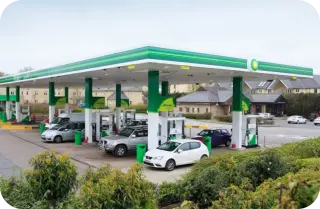
Whether you are filling up a single car or managing a whole fleet, understanding how fuel prices work is key to staying on top of your costs. Fuel pricing in the UK might seem unpredictable, but there are clear reasons behind those changing figures at the pump.
In this guide, we will break it down:
What impacts UK fuel prices
Who sets fuel prices
Why prices vary by region and station
How crude oil affects the final cost
Let's get into it.
What Impacts UK Fuel Prices?
Fuel prices in the UK are affected by a combination of global, national, and local factors. According to the RAC, around 45% of the price you pay goes straight to the treasury in fuel duty and VAT. That means less than half of what you’re paying is actually for the fuel itself.
The main contributors to fuel prices include:
Crude oil costs – the global price of oil affects the base cost of fuel
Exchange rates – oil is traded in US dollars, so a weak pound can increase the cost
Wholesale fuel prices – based on oil supply and demand, and refinery costs
Fuel duty and VAT – fixed costs set by the UK government
Distribution and retailer margins – transport and station costs
For businesses, these fluctuating elements make fuel one of the most unpredictable expenses. That’s why many companies choose to manage spend with a business fuel card to help monitor usage and stabilise budgeting.
Who Sets Fuel Prices?
Unlike utilities such as gas and electricity, fuel prices aren’t capped or directly regulated. Instead, they’re influenced by a competitive market.
Each retailer decides the price at their pumps based on their costs, profit margin, and local competition. That’s why you’ll often see petrol stations in the same area with very different prices – even for the same fuel.
While the government has introduced a fuel price transparency scheme to help customers compare costs more easily, it’s still up to the driver to shop around.
Want to simplify that for your drivers? With fuel cards that offer fixed weekly pricing, you can cut through the noise and give your business predictable pricing at the pump.
Why Do Fuel Prices Vary So Much?
Location is a major factor in fuel price differences. Fuel tends to be more expensive in remote or rural areas due to higher delivery and supply chain costs.
Other causes for price variation include:
Brand pricing strategy - Premium stations often charge more
Station size - Smaller independents may pay more for supply and pass it on
Traffic and convenience - Motorway services charge more due to captive audiences
Local competition - Fewer stations = less pressure to keep prices low
If you’re operating a fleet, understanding these variables can help reduce overall spend. Our fleet fuel cards are accepted across thousands of locations nationwide, helping you optimise where your team refuels.
How Does Crude Oil Impact Fuel Prices?
Crude oil is the raw material from which petrol and diesel are made, and its price fluctuates constantly on the global market.
Changes in oil prices are driven by:
Global supply and demand
Geopolitical tension in oil-producing regions
Production limits set by groups like OPEC
Market speculation
When oil prices rise, those increases are often passed down the chain quickly to consumers. However, when they fall, retailers are typically slower to lower pump prices, a phenomenon sometimes called the “rocket and feather” effect.
Keeping track of these trends is difficult, but with Right Fuel Card, your business can benefit from negotiated rates and consistent reporting that removes the guesswork.
Final Thoughts
Fuel pricing in the UK might seem complicated, but once you know the underlying blocks – from crude oil to retail mark-up – you’re better equipped to make smart decisions about where and how you refuel.
And if you're managing fuel for a business? The right fuel card can offer a real advantage:
Fixed pricing options
Easy tracking and reporting
Access to nationwide networks
Ready to take control of your fuel costs?
Explore our full range of fuel cards to find the right fit for your business.



